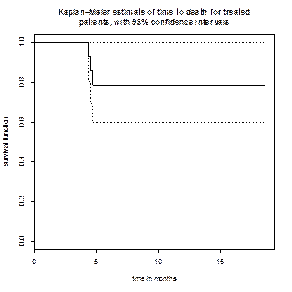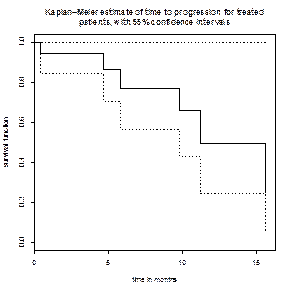Abstract
Background: Melphalan is an alkylator and in combination with dexamethasone an active and standard regimen in AL amyloidosis. However these patients relapse and other drugs are needed. Bendamustine is a bifunctional alkylating agent with established efficacy in CLL, NHL, and MM but its safety and efficacy in AL amyloidosis is not known. In an effort to investigate the activity of Ben/Dex and improve the outcome of patients with relapsed AL we conduct a multi-center, Phase 2 study of Ben/Dex in AL (NCT01222260) and report data of an interim analysis.
Methods: All patients had relapsed AL after a median of 2 prior therapies (range 1-4). Patients with very advanced cardiac involvement (NYHA Class IIIB/IV) were excluded. Patients with NYHA Class IIIA, NT-proBNP ≥ 1800 ng/L or BNP ≥ 400 ng/L, abnormal cTnT or cTnI could be included after evaluation by cardiology to determine the risk associated with the treatment. Patients with a CrCl ≥ 15 mL/min were considered for the trial if they were not in active renal failure. This Phase IIa clinical trial uses a two-stage optimal Simon design enrolling 13 patients in the first stage. Since at least three patients experienced hematologic PR or better, the trial proceeded to the second stage treating an additional 16 patients. If 9 or more patients out of the total of 29 patients evaluable for response experience a hematologic PR or better, the treatment will be considered worthy of further development. The primary objective is to determine the partial hematologic response rate (PR) of patients who received at least 2 cycles of therapy. Secondary objectives included overall hematologic response (OHR) rate, organ response rate (OrRR) (Palladini et al., JCO 2012), time to failure (TTF), toxicities (adverse events at least possibly related to treatment), overall survival (OS) and the assessment of expression of genes associated with ER stress. Patients were assigned to bendamustine according to CrCl: CrCl ≥ 60 mL/min: 100 mg/m2 IV on day 1 and 2 of each cycle, CrCl 59 – 15 mL/min: 90 mg/m2 IV on day 1 and 2 of each cycle. The option to dose escalate was available to qualifying subjects including escalating to dose level (+)1: 120 mg/m2 (if CrCl ≥ 60 mL/min at the time of inclusion into the study) and 100 mg/m2 (if CrCl 59 – 15 mL/min at the time of inclusion into the study). Dexamethasone was started at 20-40mg weekly according to the performance status of the patient.
Results: As of 7/15/14, 15 patients have received treatment. Median age was 66.5 (range 43-76). Patients received a median of 2 prior regimens (range 1-4). Six patients received prior autologous stem cell transplant. Median number of cycles is 3.5 (range is 1-9), with 5 patients still receiving treatment. Of note, only 1 patient discontinued treatment due to disease progression. Only 3 patients discontinued treatment due to AE. Most common drug-related AEs (all grades) included fatigue (67%), nausea (53%), anemia, constipation and dyspnea (47% each), limb edema and increased creatinine (40% each). Grade ≥3 AE occurring in >25% of patients were only fatigue and chronic kidney disease (27% each). Of note, no cardiac events were observed, including any increase in NT-proBNP. No deaths have occurred in association with the treatment. Of 11 patients eligible for response evaluation, 5 (45%) have responded hematologically, including (≥PR 36%, CR 9%). Median time to PR was 2 cycles and the CR occurred in a patient after 5 cycles suggesting that this heavily pretreated patient population needs longer treatment to achieve response. With a median follow-up of 8.7 months (range 1.4 to 18.6 months) the median OS has not been reached yet (Figure 1). The median PFS is 11.2 months with a range of 0.4-15.7 months (Figure 2)
Conclusions: Bendamustine in combination with dexamethasone is feasible and effective in heavily pretreated AL amyloidosis with impaired organ function (NYHA IIIB and creatinine clearance of 30-15 mL/min were allowed). Cardiac events were not observed. Preliminary hematologic response rates are promising in this heavily pretreated patient population, and organ assessments are ongoing. Further study of this approach is warranted.
Lentzsch:Bristol Myers Squibb: Consultancy; Novartis: Consultancy; Celgene: Consultancy, Research Funding. Off Label Use: Bendamustine treatment in amyloidosis .
Author notes
Asterisk with author names denotes non-ASH members.



